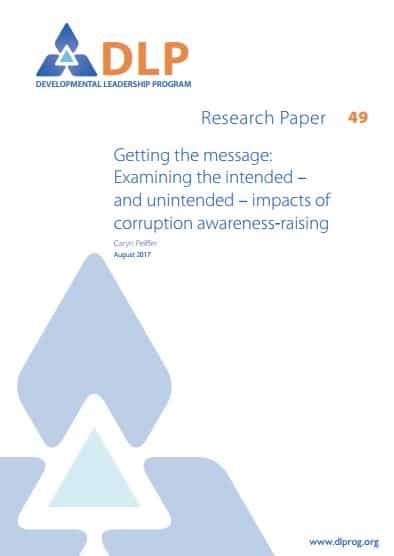This study in Indonesia examines whether and how corruption awareness-raising messages affect people’s attitudes towards corruption and their willingness to fight or resist corruption. It uses a structural equation model to test several potential mediators, drawing on data from an original survey experiment conducted across 1,000 households in Jakarta, in which respondents were randomly shown either one of four messages about corruption or no message at all.
It finds that respondents’ exposure to anti-corruption messages tended to have either very little influence on their willingness to get involved in tackling corruption, or a sizeable net negative influence:
- The messages both increased respondents’ worries about corruption harming development and reduced their confidence that citizens can easily get involved in fighting corruption.
- The messages had little overall influence on respondents’ attitudes towards reporting corruption, because they reinforced competing beliefs that counteracted each other.
- The messages reduced respondents’ willingness to join an anti-corruption organisation or to protest against corruption, largely because the messages reduced their confidence that they could easily engage in the fight against corruption.
- Only the message that highlighted the government’s anti-corruption successes elicited a substantial net positive agreement with the idea that citizens have a duty to report corruption.
The findings suggest the following:
- Pilot schemes could be used to test whether proposed awareness-raising efforts in particular contexts are likely to prompt unintended reactions.
- It is important to evaluate how anti-corruption messages make citizens feel about their ability to act against corruption.
- Highlighting the consequences of corruption can inspire citizens to be willing to take action against it.
- Stories of sincere, successful government efforts to fight corruption may help to combat ‘corruption fatigue’.
If similar conclusions are drawn from future research, researchers and policymakers seeking to use messaging to encourage citizens to act against corruption may want to focus more sharply on what types of messages mobilise and empower, and how awareness-raising efforts are likely to be received in different governance contexts.










